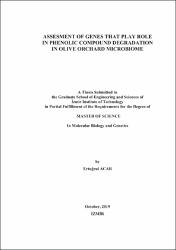Please use this identifier to cite or link to this item:
https://hdl.handle.net/11147/9634Full metadata record
| DC Field | Value | Language |
|---|---|---|
| dc.contributor.advisor | Soyer Dönmez, Ferda | |
| dc.contributor.author | Acar, Ertuğrul | - |
| dc.date.accessioned | 2020-08-27T07:20:42Z | |
| dc.date.available | 2020-08-27T07:20:42Z | |
| dc.date.issued | 2019-10 | en_US |
| dc.identifier.citation | Acar, E. (2019). Assesment of genes that play role in phenolic compound degradation in olive orchard microbiome. Unpublished master's thesis, İzmir Institute of Technology, İzmir, Turkey | en_US |
| dc.identifier.uri | https://hdl.handle.net/11147/9634 | |
| dc.description | Thesis (Master)--Izmir Institute of Technology, Molecular Biology and Genetics, Izmir, 2019 | en_US |
| dc.description | Includes bibliographical references (leaves: 46-55) | en_US |
| dc.description | Text in English; Abstract: Turkish and English | en_US |
| dc.description.abstract | The olive tree (Olea Europea L.) is one of the most important fruit trees in Mediterranean countries. Its products, olive oil and table olives, are important components of the Mediterranean diet and widely consumed all around the World. Olives and virgin oil provide a rich source for phenolic compounds. The plant phenolics are secondary metabolites, and possesses several common biological and chemical properties. In this study, microorganisms were collected from soil, olive leaves, fruits, and Olive fruit fly larva and Olive mill wastewater (OMWW). They were characterized by 16S rRNA analysis. The microorganisms that were tolerant to phenolic compounds were selected in order to seek which genes were associated with the phenolic compound degradation. The genes related to the degradation of the selected organisms were identified by Sanger Sequencing and the level of phenol-degrading gene expression were aimed to be compared by using qPCR and Droplet Digital PCR (ddPCR). Microorganisms which degrade phenolic compounds can be harnessed for the purpose of bioremediation. However, the number of defined phenolic compound degrading microorganisms is still low in the literature. For this reason, many different microorganisms were used at the same time for bioremediation. Investigation of olive orchard microorganisms and phenolic-degrading genes might benefit bioremediation in the future. In this study, 8 different bacterial strains were identified and characterized from olive orchards. After that, their phenol hydroxylase and catechol 1,2 dioxygenase genes tried to be sequenced with primers designed by using of reference strains in NCBI database. | en_US |
| dc.description.abstract | Zeytin ağacı (Olea Europea L.) Akdeniz ülkelerindeki en önemli meyve ağaçlarından biridir. Bu ağaçların ürünleri, zeytin yağı ve sofralık zeytin Akdeniz beslenme biçimin en önemli bileşenleri oluşturur ve dünya çapında tüketilir. Zeytin ve zeytin yağı fenolik bileşikler adına zengin bir kaynak sunar. Bitkisel fenolik bileşikler ikincil metabolitler olarak birtakım ortak biyolojik ve kimyasal özellikle barındırırlar. Topraktan, zeytin yapraklarından, zeytinlerden, Akdeniz meyve sineğinin larvasından ve zeytin fabrikası atık suyundan toplanan mikroorganizmalar, 16S rRNA analizi ile karakterize edilmiştir. Fenolik bileşiklerin yıkımıyla ilgili genlerin izolasyonu için fenolik bileşiklere toleransı olanlar seçilmiştir. Seçilen organizmaların yıkımla ilgili genleri sekanslanarak saptanmıştır ve gen ekspresyonu seviyesi qPCR ve Droplet Digital PCR (ddPCR) ile karşılaştırılması amaçlanmıştır. Fenolik bileşikleri yıkabilen mikroorganizmalar çevresel iyileştirme sürecine kullanılabilir. Ancak, farklı çeşitlilikte fenolik bileşikleri yıkan mikroorganizmaların sayısı hala az oldiğu için birden fazla mikroorganizma çevresel iyileştirme çalışmalarında aynı anda kullanılmaktadır. Zeytinliklerdeki mikroorganizmaların araştırılması çevresel iyileştirme için potansiyel vaat etmektedir. Bu çalışmada, zeytin bahçelerinden izole edilen 8 farklı bakteri suşu tanımlanmış ve karakterize edilmiştir. Fenol hidroksilaz ve katekol 1,2 dioksijenaz genleri NCBI veri tabanında referans suşlar kullanılarak tasarlanan primerler kullanılarak sekanslanmaya çalışıldı. | en_US |
| dc.format.extent | xii, 64 leaves | en_US |
| dc.language.iso | en | en_US |
| dc.publisher | Izmir Institute of Technology | en_US |
| dc.rights | info:eu-repo/semantics/openAccess | en_US |
| dc.subject | Olea Europea L. | en_US |
| dc.subject | Microorganisms | en_US |
| dc.subject | Olive oil | en_US |
| dc.subject | Phenolic compounds | en_US |
| dc.title | Assesment of genes that play role in phenolic compound degradation in olive orchard microbiome | en_US |
| dc.title.alternative | Zeytinlik mikrobiyomunda fenolik madde indirgenmesinde rol alan genlerin değerlendirilmesi | en_US |
| dc.type | Master Thesis | en_US |
| dc.institutionauthor | Acar, Ertuğrul | - |
| dc.department | Thesis (Master)--İzmir Institute of Technology, Molecular Biology and Genetics | en_US |
| dc.relation.publicationcategory | Tez | en_US |
| item.fulltext | With Fulltext | - |
| item.grantfulltext | open | - |
| item.languageiso639-1 | en | - |
| item.openairecristype | http://purl.org/coar/resource_type/c_18cf | - |
| item.cerifentitytype | Publications | - |
| item.openairetype | Master Thesis | - |
| Appears in Collections: | Master Degree / Yüksek Lisans Tezleri | |
Files in This Item:
| File | Description | Size | Format | |
|---|---|---|---|---|
| 10103584.pdf | MasterThesis | 2.83 MB | Adobe PDF |  View/Open |
CORE Recommender
Page view(s)
242
checked on Nov 18, 2024
Download(s)
162
checked on Nov 18, 2024
Google ScholarTM
Check
Items in GCRIS Repository are protected by copyright, with all rights reserved, unless otherwise indicated.